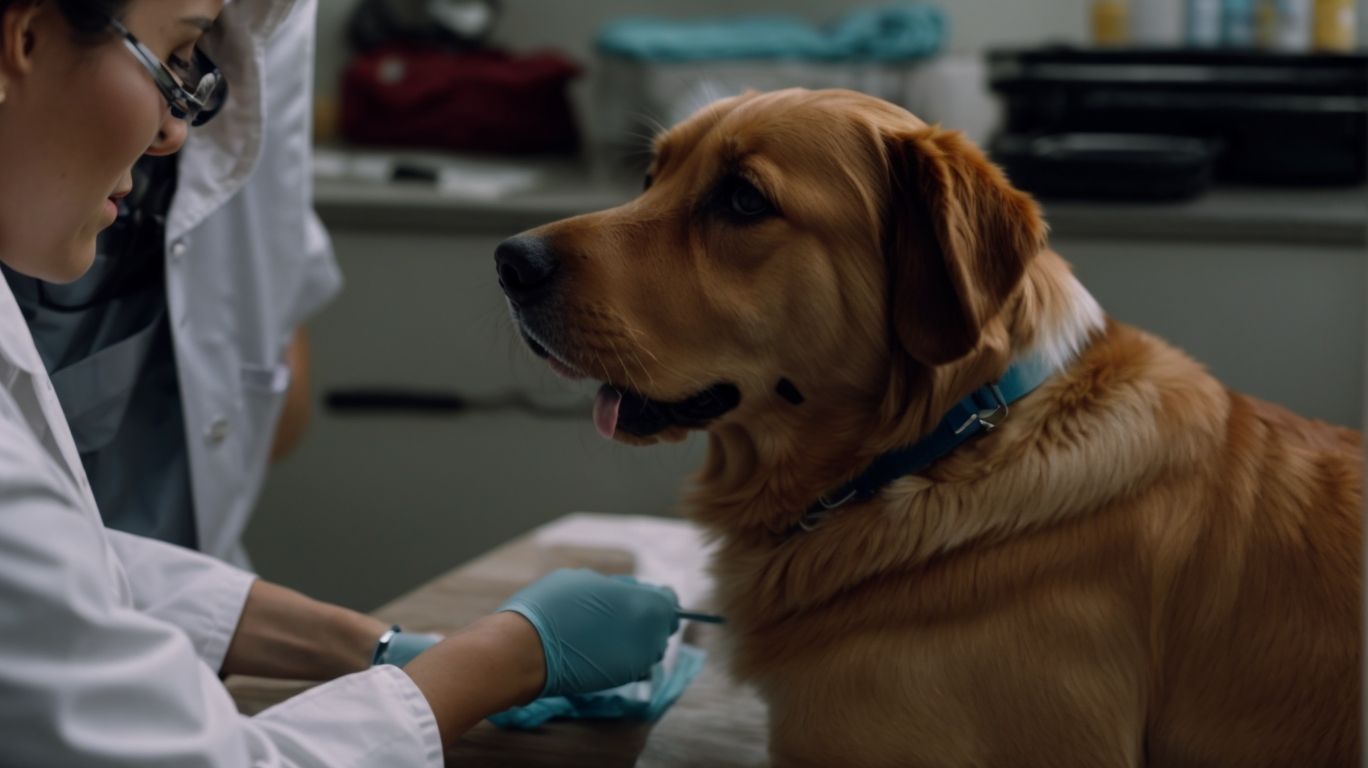
Senior Dogs and Diabetes: Key Symptoms and Health Management Tips
As our furry friends get older, they may face certain health challenges, including diabetes. In this article, we will explore the key symptoms of diabetes in senior dogs, such as increased thirst, weight loss, and lethargy.
We will also discuss the possible causes of diabetes in older dogs, including genetics and obesity. We will provide valuable tips on managing diabetes in senior dogs, such as proper diet, exercise, and insulin injections. Stay tuned to learn more about the complications of diabetes in senior dogs and how to best care for your beloved pet.
What Is Diabetes in Senior Dogs?
Managing diabetes in senior dogs is a vital aspect of their overall health and wellness. Canine diabetes, commonly found in aging pets, requires vigilant monitoring and veterinary care to regulate glucose levels and ensure a good quality of life.
This condition can significantly impact the well-being of senior dogs, affecting their energy levels, weight management, and overall comfort.
Regular check-ups and consultations with a veterinarian are essential for creating a tailored diabetes management plan that aligns with the specific needs of senior pets. Proper nutrition, exercise, and insulin administration are crucial components in controlling blood sugar levels and minimizing the risks associated with diabetes in older dogs.
By prioritizing their senior dogs’ wellness and seeking professional guidance, pet owners can help their beloved companions lead active and fulfilling lives despite the challenges of diabetes.
What Are the Symptoms of Diabetes in Senior Dogs?
Recognizing the symptoms of diabetes in senior dogs is essential for effective health management and maintaining their quality of life. Monitoring these symptoms is crucial due to the impact of aging process and the need for lifestyle adjustments to support their overall wellness.
Senior dogs with diabetes may display symptoms such as increased thirst, frequent urination, weight loss, and lethargy. They may experience changes in appetite and have difficulty walking or jumping.
Managing their condition requires ongoing monitoring of blood glucose levels, regular vet check-ups, and adjustments to their diet and exercise routines. By addressing these symptoms and making necessary lifestyle changes, senior dogs with diabetes can lead a comfortable and fulfilling life.
Increased Thirst and Urination
One of the key symptoms of diabetes in senior dogs is increased thirst and frequent urination, which can signify underlying health issues.
Monitoring these signs is crucial for early detection and effective management of diabetes.
This increased thirst, known as polydipsia, and frequent urination, known as polyuria, can serve as a red flag for pet owners to seek veterinary attention.
Senior dogs are more prone to developing diabetes, making it essential to monitor their water intake and bathroom habits closely.
Detecting and addressing diabetes early is vital for maintaining the overall health and well-being of our beloved furry companions.
Weight Loss
Weight loss in senior dogs can be a prominent symptom of diabetes, indicating the need for dietary adjustments, exercise, and close monitoring to address potential health concerns and support their overall wellness.
This significant indication underscores the importance of a well-balanced diet, tailored to the specific nutritional needs of senior dogs with diabetes.
Regular exercise not only helps manage weight but also improves insulin sensitivity. Ongoing monitoring, including regular check-ups and blood glucose testing, is crucial to detect any fluctuations and ensure effective management of the condition. By focusing on these aspects, pet owners can play a vital role in enhancing the quality of life for their senior dogs with diabetes.
Decreased Appetite
A decreased appetite in senior dogs can be indicative of diabetes and requires careful health management, focusing on proper nutrition and dietary adjustments to support aging pets’ overall wellness.
This condition can significantly affect the well-being of senior dogs, as diabetes can lead to complications such as weight loss, fatigue, and increased thirst. Consequently, customized nutrition plans play a crucial role in managing diabetes in aging pets.
This includes ensuring balanced meals, possible adjustments in feeding frequency, and monitoring their overall health. Owners must be vigilant in observing changes in their pet’s appetite and seek advice from a veterinarian to address any concerns promptly, promoting the best possible quality of life for their beloved companion.
Vomiting and Diarrhea
Vomiting and diarrhea in senior dogs can be potential symptoms of diabetes, requiring prompt veterinary support to address underlying health issues and ensure proper management for their overall well-being.
These symptoms can often be overlooked as signs of aging, but it’s crucial for pet owners to recognize them as potential indicators of diabetes in senior dogs.
Once diagnosed, the guidance of a veterinarian is essential in managing the condition and averting potential health issues. With appropriate veterinary support, including tailored treatment plans and dietary adjustments, senior dogs with diabetes can lead fulfilling lives and avoid complications associated with the disease, contributing to their overall health and well-being.
Lethargy
Lethargy in senior dogs can indicate potential health concerns, requiring lifestyle adjustments and supportive care to ensure their comfort and well-being, particularly in the context of palliative care for aging pets.
This symptom can significantly impact a senior dog’s quality of life, affecting their mobility, interest in activities, and overall happiness.
Through lifestyle adjustments, such as providing comfortable resting areas and gentle exercise, and supportive care, such as pain management and nutritional support, senior dogs can experience improved comfort and well-being.
In the context of palliative care, these measures become even more critical to offer aging pets the best possible quality of life as they navigate their later years.
What Causes Diabetes in Senior Dogs?
The causes of diabetes in senior dogs can stem from genetic predispositions, the aging process, and the need for lifestyle adjustments, underscoring the importance of veterinary advice and proactive health management.
Genetic predispositions play a significant role in the development of diabetes in senior dogs. Certain breeds are more prone to diabetes due to inherited genetic factors. As dogs age, their bodies undergo changes that can affect insulin production and glucose regulation, leading to an increased risk of diabetes.
Lifestyle adjustments such as diet and exercise can also influence the onset of diabetes in senior dogs. Veterinary advice is crucial for early detection, management, and tailored strategies to support the overall health of senior dogs.
Genetics
Genetic factors can play a significant role in predisposing senior dogs to diabetes, highlighting the importance of proactive veterinary care and effective management strategies to address potential genetic influences.
Genetic influences can contribute to the development and progression of diabetes in senior dogs. Proactive veterinary care is crucial in identifying genetic predispositions to diabetes early on, allowing for timely intervention and management.
Effective management strategies, such as tailored nutrition plans and regular monitoring, are essential in mitigating the impact of genetic factors on diabetes. By prioritizing proactive veterinary care and implementing effective management strategies, senior dogs with genetic predispositions to diabetes can lead healthier and more comfortable lives.
Obesity
Obesity can contribute to the development of diabetes in senior dogs, highlighting the importance of weight management, dietary considerations, and regular exercise to mitigate potential health risks and promote overall wellness.
Excess weight in senior dogs can lead to insulin resistance and a higher likelihood of developing diabetes. Implementing a balanced diet, tailored to their specific nutritional needs, along with regular physical activity, is crucial to combat these risks.
Weight management through portion control and providing low-calorie yet nutrient-dense food can significantly reduce the chances of diabetes onset. Incorporating daily exercise routines, such as walks and playtime, can help maintain muscle mass, regulate blood sugar levels, and enhance overall well-being.
Pancreatitis
Pancreatitis can contribute to the onset of diabetes in senior dogs, necessitating ongoing monitoring and veterinary support to address potential pancreatic health issues and ensure effective management of related conditions.
Senior dogs are particularly susceptible to pancreatitis, and when left unmanaged, it can lead to the development of diabetes. That’s why consistent monitoring and regular check-ups with a veterinarian are crucial to detect any signs of pancreatic issues early on.
By staying proactive, pet owners can help mitigate the risk of diabetes and ensure that their senior dogs receive the necessary support for their overall health and well-being.
How Can Diabetes in Senior Dogs Be Managed?
Managing diabetes in senior dogs involves a holistic approach encompassing health management, insulin administration, dietary considerations, exercise regimens, and continuous monitoring to ensure their well-being and quality of life.
This comprehensive approach aims to address various aspects of a senior dog’s health.
Insulin administration plays a crucial role in regulating their blood sugar levels, while dietary considerations focus on providing a balanced, low-glycemic diet to support their overall health.
Incorporating suitable exercise regimens tailored to the dog’s age and condition is vital in managing diabetes, as it helps maintain healthy weight and improves insulin sensitivity.
Continuous monitoring of their condition, including regular vet check-ups and blood sugar testing, is essential for early detection of any fluctuations and adjustments to their management plan.
Diet and Nutrition
Diet and nutrition play a pivotal role in managing diabetes in senior dogs. This emphasizes the importance of tailored wellness plans and preventive care to address dietary requirements and support their overall health.
When creating meal plans for senior dogs with diabetes, it’s crucial to consider their specific needs and sensitivities. A well-balanced diet can help stabilize blood sugar levels and prevent complications. However, it’s important to regularly monitor and adjust the meal plan to meet the dog’s changing nutritional needs. With proper dietary management and preventive care, these dogs can experience an improved quality of life and overall wellness.
Exercise
Regular exercise and lifestyle adjustments are essential components of managing diabetes in senior dogs, contributing to the maintenance of their quality of life and overall well-being.
Making lifestyle adjustments, such as maintaining a well-balanced diet and engaging in appropriate physical activity, is crucial for regulating blood sugar levels and preventing complications in aging dogs with diabetes.
Regular exercise not only aids in weight management but also promotes mobility and joint health, which are essential for senior dogs. It can also have a positive impact on their mental well-being, reducing anxiety and stress.
By incorporating these practices into their daily routine, senior dogs with diabetes can experience a higher quality of life and increased vitality.
Insulin Injections
Insulin injections are a vital aspect of managing diabetes in senior dogs. This requires proper medication administration and close veterinary care to regulate blood sugar levels and ensure effective treatment.
This essential form of treatment plays a critical role in enabling senior dogs with diabetes to lead healthy and comfortable lives. The administration of insulin injections, accompanied by regular monitoring and expert guidance from veterinary professionals, is pivotal in maintaining stable blood sugar levels.
With the right medication and close veterinary care, diabetic senior dogs can experience an improved quality of life, reduced risk of complications, and enhanced overall well-being. This highlights the significance of effective management in this context.
Regular Vet Check-ups
Regular veterinary check-ups are essential for managing diabetes in senior dogs. These check-ups provide crucial support for addressing chronic conditions and ensuring proactive care to maintain their overall health and well-being.
During these check-ups, veterinarians can closely monitor the dog’s diabetes management, adjusting medications or treatment plans as needed to keep the condition stable.
Regular visits also allow for early detection of any complications or changes in the dog’s health, enabling timely intervention. This proactive approach is vital in maintaining the overall well-being of senior dogs with diabetes, ensuring they receive the necessary support and care for their chronic condition.
Monitoring Blood Sugar Levels
Continuous monitoring of blood sugar levels is paramount in managing diabetes in senior dogs, underlining the significance of proactive health management to support their overall well-being.
This proactive approach allows pet owners to stay ahead of potential complications, ensuring that their senior dogs receive the ongoing care they need.
Regular monitoring enables early detection of any fluctuations in blood sugar levels, empowering caregivers to make timely adjustments to their pets’ treatment plans.
By prioritizing health management and monitoring, owners can help their senior dogs maintain a higher quality of life and minimize the impact of diabetes on their overall well-being.
What Are the Complications of Diabetes in Senior Dogs?
Diabetes in senior dogs can lead to various complications, necessitating supportive care and proactive management strategies to maintain their overall wellness and quality of life.
This often involves monitoring their blood sugar levels, administering medications as prescribed by the veterinarian, and implementing a well-balanced diet.
Senior dog care for diabetic pets may require lifestyle adjustments, such as increased exercise and regular veterinary check-ups to address any emerging issues promptly. It’s essential to recognize the signs of diabetes in senior dogs, such as excessive thirst, frequent urination, and weight loss, as early detection and intervention can significantly impact their quality of life.
Cataracts
Cataracts are a common complication of diabetes in senior dogs. This highlights the need for preventive care and a holistic approach to address potential eye problems and support their overall well-being.
This is particularly important because diabetes can accelerate the development of cataracts in senior dogs.
Regular check-ups with a veterinarian, maintaining a balanced diet, and providing regular exercise can contribute to preventive care.
A holistic approach involves not only addressing the specific eye problems but also supporting the dog’s overall health, including stress management and maintaining a comfortable living environment.
Ensuring that the dog’s diabetes is well-managed is crucial in preventing complications such as cataracts. This emphasizes the importance of a multifaceted approach to their care.
Kidney Disease
Kidney disease can arise as a complication of diabetes in senior dogs, necessitating comprehensive wellness strategies for managing chronic conditions and ensuring palliative care for their overall well-being.
This includes closely monitoring their kidney function, modifying their diet to support renal health, and providing proper hydration.
Along with medical interventions, senior dogs with diabetes-related kidney disease also benefit from regular exercise tailored to their abilities, emotional support, and a comfortable environment.
It’s crucial to address their pain management and overall quality of life, ensuring they receive the best possible care during their senior years.
Urinary Tract Infections
Urinary tract infections can be a common complication of diabetes in senior dogs, necessitating veterinary support and measures to ensure their comfort and well-being in addressing potential infections.
These infections can significantly impact the overall health and happiness of senior dogs, making it crucial for pet owners to recognize the signs and seek prompt veterinary care.
Older dogs with diabetes are more prone to developing urinary tract infections due to weakened immune systems and impaired bladder function. Thus, proactive measures such as regular veterinary check-ups, proper hydration, and a balanced diet are essential in managing their comfort and minimizing the risk of infections.
Providing a clean and comfortable living environment and ensuring they have opportunities for regular bathroom breaks also contribute to their overall well-being.
Neuropathy
Neuropathy can develop as a complication of diabetes in senior dogs, necessitating veterinary care and a deeper understanding of aging pets to provide effective support and bonding in managing this condition.
As dogs age, their bodies undergo various changes, making them susceptible to health issues such as diabetes-related neuropathy. It’s crucial for pet owners to recognize the signs of neuropathy, including weakness, pain, and difficulty walking.
Early intervention can significantly improve the dog’s quality of life. By fostering a deeper understanding of aging pets and seeking professional veterinary care, pet owners can strengthen their bond and improve their furry companion’s well-being. This ensures they can continue to enjoy a happy and active life.




No Comments